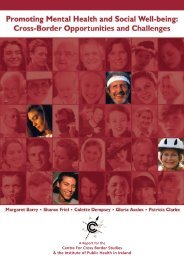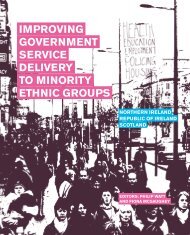PRIDE OF OUR PLACE - The Centre for Cross Border Studies
PRIDE OF OUR PLACE - The Centre for Cross Border Studies
PRIDE OF OUR PLACE - The Centre for Cross Border Studies
- No tags were found...
You also want an ePaper? Increase the reach of your titles
YUMPU automatically turns print PDFs into web optimized ePapers that Google loves.
heritage and howdifferent areas can haveclose associations.(Teacher, Year Two)It was very evident from theteacher feedback sessionsand questionnaire responsesthat pupils loved the wholeconcept of showing off theirplace to others. This socialaspect of learning was keyto the whole project. It emerged very strongly from Year One that engaging the pupils ingroups, with varied and challenging activities and where communication and activity werecentral to the work, proved to be a most successful experience. <strong>The</strong>re are valuable lessons tobe learned here <strong>for</strong> all teaching and learning experiences: pupils must be af<strong>for</strong>ded theopportunities to direct their own learning and to work collaboratively and co-operatively. Realand meaningful learning will then take place. <strong>The</strong>se teaching and learning experiences arecritical to the successful development of all the key skills <strong>for</strong> pupils. Schools need to ask pupilsabout teaching and learning experiences, listen to what they are saying and act upon whatthey say.Children are children no matter where they come from, no matter how different theiraccents are. (Teacher, Year One)No barriers between children, they take each other at face value - a lesson to us all.(Teacher, Year One)I think this was summed up by a boy in fifth class. He met a lady from the North of Irelandon the train to Dublin and chatted to her. She was from Dungannon and he discussed theproject with her. <strong>The</strong> children feel a real connection with the people they met. (Teacher,Year One)<strong>The</strong> pupils’ learning about respect and co-operation is supported by the richness of thefollowing quotes:Tradition and barriers do not really exist among children, I have discovered. <strong>The</strong> childrenrespected each other and this was enhanced by the way they could see the staff getting alongtogether. Perhaps we don’t give credit to the children <strong>for</strong> their intuition at times.(Teacher, Year One)Pupils realize that they may live in a different place and go to a different size school but weare essentially the same – same interests, likes and dislikes – and that one school may havesomething that the other doesn’t. (Teacher, Year One)We discovered that the other school was no different to ourselves. (Teacher, Year One)<strong>The</strong> organisation of play activities by the schools during exchange visits provided manyopportunities <strong>for</strong> the pupils to get to know each other in an in<strong>for</strong>mal and friendly way. In futurework of this kind, this social aspect should be a key aspect of the process. Some of the schoolsprepared <strong>for</strong> this play aspect by teaching pupils traditional games from the locality to sharewith the visiting school.Children play no matter who they are or where they are. <strong>The</strong>se children just got on with it,32 Pride of our Place 2002-2006
















